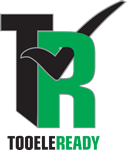Earthquakes

Actions for Earthquake
Before an Earthquake
Secure water heaters, storage shelves, heavy mirrors, shelves, etc. to studs
➤ Place large or heavy objects on lower shelves
➤ Know where and how to shut off electricity, gas and water at main switches and valves
➤ Have earthquake drills – identify safe spots in each room
➤ Develop a plan for reuniting your family after an earthquake
➤ Review your insurance policies
➤ Keep a good pair of shoes and a flashlight near your bed
➤ Prepare to survive on your own for at least four days.
➤ Participate in Utah’s Great Shake Out annually in the spring.
During an Earthquake
Drop, cover and hold on to the protective cover
➤ Stay calm
➤ Inside: stay inside and find protection by crouching under a desk or table away from windows, glass, brick walls, and chimneys
➤ Outside: stand away from buildings, trees, telephone and electric lines
➤ On the road: drive away from underpasses or overpasses. Stop in a safe area. Pull your vehicle to the side of the road Stay in your vehicle be aware of damage that may have occurred on the road as you continue driving after the shaking has stopped
➤ In an office building: stay next to a pillar or column or under a heavy table or desk and hold on to it
➤ Stay where you are until the shaking has stopped and you are sure it is safe to move Remain calm and stay inside during an earthquake unless you are in serious danger.
After an Earthquake
➤ Don’t panic. If you’re trapped, make noise by tapping, whistling, or singing, etc.
➤ Check for injuries. Provide first aid
➤ Check for fires; gas, water, sewage breaks; downed electrical lines; building damage and potential problems that might occur during aftershocks, such as cracks around fireplaces and foundations. Turn off interrupted utilities as necessary. Remember to only turn the gas off if you
• You smell natural gas,
• You hear natural gas leaking (a hissing, blowing or roaring sound),
• You see structural damage to your home,
• There’s fire in close proximity to your home, or
• Questar makes the request.
➤ Clean up dangerous spills
➤ Wear heavy gloves and heavy shoes in all areas near broken glass or debris. Keep your head and face protected from falling debris Wear a protective mask to reduce the risk of inhaling dust and smoke
➤ Tune radio to the emergency alert station and listen for instructions from public safety agencies
➤ Use the telephone only for life threatening emergencies
➤ As soon as possible, notify family and friends that you are safe
➤ Do not use matches or open flames until you are sure there are no gas leaks
➤ Don’t turn light switches off and on. Sparks created by the switch can ignite gas fumes
➤ In public buildings, follow evacuation procedures immediately and return only after the building has been declared safe by the appropriate authorities
Utah is earthquake country. Earthquakes can strike at any time without warning, causing major damage to homes and critical infrastructures. They are almost always followed by aftershocks that can be even larger than the initial quake.
The Working Group on Utah Earthquake Probabilities (WGUEP) has assessed the probability of large earthquakes in the Wasatch Front region. There is a 43 percent probability of one or more magnitude (M) 6.75 or greater earthquakes and a 57 percent probability of one or more M6.0 or greater earthquakes in the region in the next 50 years

